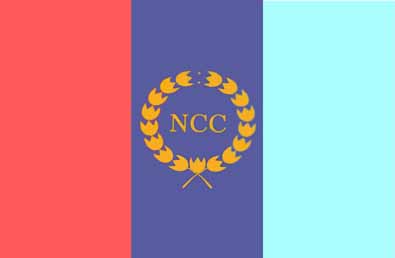
NCC Full Form: NCC is a youth development program in India that aims to instill qualities of leadership, discipline, and patriotism among the country's youth. Read this article to know about NCC Full Form, NCC Motto, NCC History, NCC Flag, NCC Roles and Objective, and much more.
NCC Full Form Overview
NCC is organized into Army, Navy, and Air Force wings, providing a platform for cadets to explore their interests in various domains. Each wing has its distinct uniform and training regimen. Let us know more through this overview table :-| Category | Overview |
|---|---|
| Formation | National Cadet Corps (NCC) |
| Founded | 1948 |
| HQ Location | New Delhi, India |
| Type | Tri-Services Youth Organization |
| Components | Army, Navy, and Air Wing |
| Membership | High school, college, and university students |
| Core Principles | Discipline, Leadership, Character, Unity |
| Motto | "Unity and Discipline" |
| Flag Design | Tricolour with emblem (Army, Navy, Air Force colors) |
| Training Focus | Physical fitness, leadership, discipline, adventure, community development |
| Objectives | Develop disciplined, patriotic citizens, build character, leadership skills |
| Activities | Military training, adventure pursuits, community service |
| Officer Development | Provides officer recruitment for Indian Armed Forces |
| Roles in Conflicts | Second line of defense, logistics, rescue, relief |
| Gender Inclusivity | Open to both male and female cadets |
| Conduct Code | Adherence to discipline, punctuality, honesty |
| Emblem | National emblem featuring "NCC" |
What is the Full form of NCC?
NCC stands for National Cadet Corps (NCC). The National Cadet Corps (NCC) stands as a prestigious institution in India, epitomizing the values of discipline, patriotism, and character-building among the youth. Established as a non-profit organization, the NCC recruits cadets from high schools, colleges, and universities across the nation, offering comprehensive training in physical fitness, leadership, discipline, integration, adventure, and community development. As the world's most renowned uniformed youth organization, the NCC plays an important role in shaping the future leaders and citizens of the country.
NCC Motto
The NCC's motto and its evolution have been significant aspects of its identity. During the 11th major advisory conference (CAC) on August 11, 1978, various taglines were considered, including "Duty and Discipline," "Duty, Unity, and Discipline," "Duty and Unity," and "Unity and Discipline." Ultimately, on October 12, 1980, the NCC adopted the Motto "Unity and Discipline."
The NCC aspires to become and already serves as one of the nation's most impactful unifying forces. It brings together young individuals from diverse regions of the country with the goal of shaping united and disciplined citizens.
History and Evolution of NCC
The seeds of the NCC were sown in the aftermath of India's independence in 1947. The first form of NCC was organized in 1948, under the visionary leadership of Brigadier M. L. Rawat. His efforts in shaping the youth into disciplined and responsible citizens earned him the esteemed title of the 'father of NCC.'
The NCC Act of 1948 formalized its existence, establishing the framework for its growth and impact. Over the years, the NCC has evolved from its military-oriented roots to become a holistic youth development organization, encompassing character-building, leadership skills, and social service.
Mission and Ideals of NCC
The NCC's mission revolves around developing disciplined and patriotic citizens who contribute positively to society. The core values embraced by the NCC reflect its commitment to build strong character and leadership qualities. These values include respect for the Indian Constitution, commitment to national development, respect for diversity, honesty, hard work, truthfulness, and a healthy lifestyle.
The tagline of the NCC, "Unity and Discipline," encapsulates its vision of creating a unified and disciplined youth force that transcends barriers of language, religion, and culture.
Structure and Organization of NCC
The NCC operates under the aegis of the Ministry of Defence and is divided into three service wings: the Army Wing, the Navy Wing, and the Air Wing. Its headquarters is situated in New Delhi. The organization is spread across the nation, comprising 17 directorates, each headed by a Brigadier or equivalent officer. NCC units are present in schools, colleges, and institutions, reaching out to young minds and shaping them into responsible citizens and future leaders.
NCC Training
NCC's training regimen is structured into five categories: annual camps, weapon training, aviation, sea training, and familiarization with military institutions. While the NCC's roots lie in military training, its scope has expanded to encompass a wide array of activities that contribute to holistic development.
Cadets not only undergo physical training but also engage in adventure activities, social service projects, and leadership development programs. The impact of NCC training is profound, as it shapes the character, values, and leadership abilities of the youth.
NCC Role in Nation-Building
The NCC's role extends beyond its training programs. It actively engages in community development initiatives, ranging from adult literacy campaigns and drug addiction awareness to tree planting and blood donation drives. These initiatives reflect the NCC's commitment to instilling a sense of selfless service and social responsibility among its cadets. The NCC also plays a crucial role during times of conflict, with cadets serving as the second line of defense. Their dedication and readiness to serve the nation in times of need are commendable.
NCC's Contribution to Officer Recruitment
One of the significant contributions of the NCC to the Indian Armed Forces is officer recruitment. A substantial number of cadets who undergo NCC training go on to receive officer training at prestigious institutions like the Officers Training Academy, the Indian Military Academy, and the National Defence Academy.
The NCC's emphasis on leadership development and character-building prepares cadets to take on leadership roles within the military and beyond. This contribution underscores the NCC's role in nurturing future leaders who will serve the nation with integrity and dedication.
Challenges and Opportunities in NCC
While the NCC's impact is undeniable, it faces its share of challenges. Adapting to the evolving needs of society and ensuring inclusivity are vital aspects of the organization. Additionally, in an era of rapid technological advancements, the NCC must strike a balance between traditional values and modern skills. Leveraging technology and incorporating contemporary training methods can enhance the NCC's effectiveness in shaping the youth for the challenges of the future.
NCC Flag
The introduction of the NCC flag across its various units took place in 1951. This flag was meticulously designed to align with the pattern, color, and size identical to those used by different regiments of the Army. The sole distinction lay in the incorporation of the NCC badge and unit designation positioned at the center of the flag. However, a subsequent realization emerged that the flag should mirror the inter-service essence of the Corps.

In 1954, a pivotal transformation occurred with the introduction of the existing tricolor flag. The tricolor is symbolic of the three constituent services of the Corps, exemplifying the profound connection between the Army, Navy, and Air Force. The color red signifies the Army, deep blue represents the Navy, and light blue embodies the Air Force. Within the heart of the flag, the golden letters "NCC" stand in tandem with the NCC crest, enfolded by an elegant wreath of lotus. This amalgamation imparts a vibrant aesthetic to the flag and imparts it with a unique and recognizable identity.
Benefits of NCC Membership
As highlighted earlier, participation in the NCC enhances students' interpersonal skills. Alongside personal growth, one of the notable benefits of NCC membership lies in the official certification awarded upon successful completion of the program and fulfillment of attendance requirements. While the NCC program is advantageous for individuals aspiring to join the Indian Armed Forces, it's important to note that joining the Indian Army post-program completion is not mandatory. Additionally, the benefits of NCC encompass the development of self-discipline and problem-solving capabilities. NCC offers three distinct types of certifications based on the duration of the course, namely the 'A' Certificate, 'B' Certificate, and 'C' Certificate. These certifications play a pivotal role in not only military and public sectors but are also recognized as valuable assets by numerous private sector businesses. Including NCC certifications on your CV, particularly the prestigious 'C' Certificate, can provide insight into your character and contribute positively to your professional profile.NCC Full form in Hindi
राष्ट्रीय कैडेट कोर (NCC) भारत में एक प्रतिष्ठित संस्थान के रूप में उभरता है, जो अनुशासन, देशभक्ति और चरित्र निर्माण की मूलभूत मूल्यों को प्रतिष्ठित करता है। एक गैर-लाभकारी संगठन के रूप में स्थापित, एनसीसी देशभर में उच्च माध्यमिक विद्यालयों, कॉलेजों और विश्वविद्यालयों से कैडेटों की भर्ती करता है, जो शारीरिक स्वास्थ्य, नेतृत्व, अनुशासन, एकीकरण, साहस, और सामुदायिक विकास के क्षेत्र में समागमवर्गीकृत प्रशिक्षण प्रदान करता है। दुनिया की सबसे प्रसिद्ध समरूप युवा संगठन के रूप में, एनसीसी देश के भविष्य के नेता और नागरिकों को बनाने में महत्वपूर्ण भूमिका निभाता है।
The National Cadet Corps remains an invaluable institution in India's journey toward progress and development. Through its emphasis on unity, discipline, character-building, and leadership development, the NCC shapes young minds into responsible citizens and future leaders. As the organization continues to evolve to meet the changing needs of society, it stands as a timeless institution that empowers young minds to become pillars of strength and integrity. The NCC's legacy is not merely in its military training but in its role as a force that instills values, fosters camaraderie, and nurtures a sense of duty towards the nation. As the NCC continues to march forward, it carries with it the hopes and aspirations of a nation that believes in the power of its youth to shape a brighter future.
| BSF Full Form Related Links | |
| NDA Full Form | ITBP Full Form |
| CISF Full Form | SSB Full Form |
| BSF Full Form | CDS Full Form |
NCC Full Form FAQs
Q1. What is the full form of NCC?
Q2. When was NCC founded, and where is its headquarters located?
Q3. What are the core principles of NCC?
Q4. What is the NCC motto, and when was it adopted?
Q5. What is the mission of NCC?










